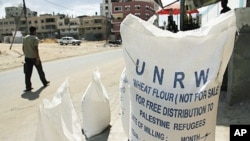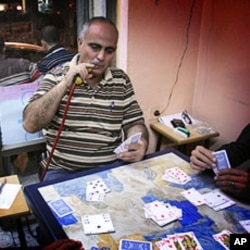When U.S. Congress confirmed last week that it was blocking the transfer of $200 million in aid to the Palestinian territories, accusations of the U.S. resorting to “aid blackmail” and “collective punishment” quickly followed.
The administration of President Barak Obama has been clear about its opposition to the Palestinians’ request for statehood recognition by the U.N. But Palestinian President Mahmoud Abbas defied the admonishment and submitted his formal application for full U.N. membership despite Washington’s pleas.
That said, it was the U.S. Congress that reacted quickly - exercising its political clout and stopping the aid transfer expected to arrive here in the first week of October. In some ways, observers say, Palestinians got caught-up in an internal U.S.-government conflict.
USAID - which administers most the U.S. development assistance to the Palestinian Authority - declined to comment on the situation. A U.S. government official in Tel Aviv said they are working with Congress to release the aid, which is essential for programs to continue in the Palestinians territories.
At this stage, the actual impact of the aid stoppage is difficult to measure. Many of the organizations involved in assistance-giving have shied away from talking to the media. Some employees of U.S.-funded projects have received notices of employment termination, but have also declined to comment. Some say these termination notices are only a precautionary measure should funds not be released.
Dependent on aid
The Palestinian economy and the Palestinian Authority (P.A.) in partcular are heavily dependent on foreign aid – nor only from the U.S., but also from Europe and Arab states.
In the P.A.-controlled West Bank both the administration, as well as development and humanitarian projects, are funded with international money. In Gaza, the situation is more complicated. Shortly after Hamas took control of the strip - many foreign donors cut funds or re-routed money to avoid it touching hands in the Hamas government, as the party is considered a terrorist organization by the U.S. and other Western states.
Foreign funded development and humanitarian projects still operate in Gaza - many carefully maneuvering to avoid cooperation and even contact with the Hamas authorities.
Gazans quickly suffered the consequences of choosing to elect Hamas.
But, Hani Busbus, a Gazan political analyst, points-out that P.A. salaries are also at risk. Despite the P.A. not operating in Gaza since they were violently kicked from the strip, thousands still receive a salary from Ramallah. “These people buy goods and it helps the market,” says Busbus.
Sami Bakheer is one of the P.A.-paid employees paid in Gaza, earning around $450 in salary each month.
“I’m not scared,” says 33-year-old Bakheer, standing in a shop in Gaza city’s Shati refugee camp. Bakheer says it’s better for Palestinians to take money from Arab States than from the U.S.
But outside the shops sit several 30 kg bags of grain disturbed by UNRWA - an organization funded with U.S. money. Gazans are heavily reliant on such food aid.
Fed-up with negotiations
On the streets of Ramallah, Bakheer’s comments are echoed.
“Why can’t we depend on ourselves?” asked Ibrahim Mussa, a Palestinian-American who works in real estate in the West Bank. “There are a lot of Palestinian people all around the world that could support us…And the Muslim countries have money, they can support us.”
Many here say they are fed up with decades of U.S.-sponsored negotiations that have failed to create a state for them. Both the aid and talks promised under the Oslo Accords, now seem at risk.
In fact, most Palestinians supported the U.N. bid despite knowing it would result in U.S. aid cuts, according to a mid-September survey of residents in the West Bank and Gaza Strip by the Palestinian Center for Policy and Survey Research (PSR).
Nearly three quarters of polled Palestinians said negotiations with Israel are pointless, without a freezing of Israeli settlement construction and clear terms of reference.
“Why are the Americans stopping the aid for us when we’ve been on their side all the time?” said Mussa, as he played cards in as small café in central Ramallah. “Why should we be scared?”
Many responding to the PSR survey also said they thought Israel would soon cancel tax transfers to the P.A., which make-up a substantial part the authority’s budget.
This, some say, could cause the collapse of the authority.
Faith in Arab donors
“The Congress is asking the Administration to punish Palestinian people,” says Hani Masri, a political analyst based in Ramallah. “We need to change the strategy.”
Though Arab donors have often been an unreliable source of funds for Palestinians, Masri believes the Palestinian leadership must refocus on building connections with Arab states. He is quick to point to regional changes this year saying Palestinians have new hope for support from the region. If U.S. aid remains blocked and Palestinian leaders choose the approach suggested by Masri, U.S. influence could theoretical diminish here. And on the streets of the West Bank and Gaza, many don’t seem to mind.
“We don’t need the money,” says Mussa. “We need a state.”







